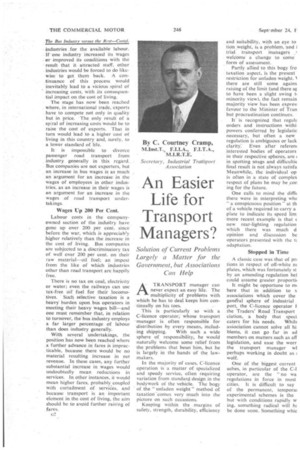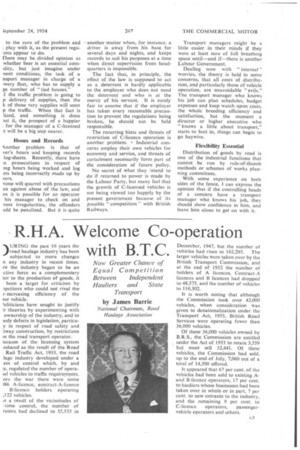An Easier Life for Transport Managers?
Page 116

Page 117

If you've noticed an error in this article please click here to report it so we can fix it.
By C. Courtney Cramp,
F.I.I.A., M.I.R.T.E.
TRANSPORT manager can never expect an easy life. The multiplicity of problems with which he has to deal keeps him continually on his toes.
This is particularly so with a C-licence operator, whose transport -manager is often responsible for distribution by every means, includ
ing shipping. With such a wide sphere of responsibility, he would -naturally welcome some relief from the problems that beset him, but he is largely in the hands of the lawmakers.
In the majority of cases, C-licence operation is a matter of specialized and speedy service, often requiring variation from standard design in the bodywork of the vehicle. The bogy of the "unladen weight" method of taxation-comes very much into the picture on such occasions.
Keeping within the margins of safety, strength, durability, efficiency
and suitability, with an eye to lion weight, is a problem. -and i trial transport managers .3 welcome a change to some form of assessment.
Partly allied to this bogy fro • taxation aspect, is the present restriction for unladen weight. there are still some agains raising of the limit (and there ar to have been a slight swing ti minority view), the fact remain majority view has been expresf favour to the Minister of Tran but procrastination continues.
It is recognized that reguk orders and instructions withi, powers conferred by legislatic necessary, but often a new regulation is ambiguous or lack clarity-. Even after referenc interested bodies of operators in their respective spheres, are I in spotting snags and difficultic final result is not always satisfa Meanwhile, the individual op, is often in a state of complex respect of plans he may be .con ing for the future.
One calls to mind the diffic there were in interpreting wha "a conspicuous position " at th of a vehicle required to carry a plate to indicate its speed lim: more recent example is that ( new rear-lighting regulation which there was much d opinion and discussion be operators presented with the tl adaptation.
Stopped in Tune
A classic case was that of pri lions in respect of off-white nt plates, which was fortunately st by an amending regulation bet could assume greater proportii It might be opportune to m, here that in addition to s associations which cover the general sphere of industrial port, the C-licence operator the Traders' Road Transport ciation, a body that spedi caters for his needs. Whils association cannot solve all hi blems, it can go far in ad members on matters such as aff legislation, and ease the worr the transport manager wl perhaps working in doubt as ; wolf.
One of the biggest current aches, in particular of the C-1 operator, are the " no wa regulations in force in most cities. It is difficult to say of the permanent, temporal experimental schemes is the but with conditions rapidly w ing, something radical will hz be done soon. Something whic to the core of the problem and play with it, as the present reguems appear to do.
[here may be divided opinion as whether beer is an essential cornelity, but just imagine under ;sent conditions, the task of a nsport manager in charge of a !wery fleet, who has to supply a ge number of "tied houses."
f the traffic problem is going to p delivery of supplies, then the k of those very supplies will soon p the traffic. When that fact is lized, and something is done mt it, the prospect of a happier for the manager of a C-licensed e will be a big step nearer.
Hours and Records
knother problem is that of ver's hours and keeping records log-sheets. Recently, there have .n prosecutions in respect of )ng hours being worked and log ets being incorrectly made up by vers.
gone will quarrel with precautions en against abuse of the law, and en it is possible for an operator his manager to check on and vent irregularities, the offenders .uld be penalized. But it is quite another matter when, for instance, a driver is away from his base for several days and nights, and keeps records to suit his purposes at a time when direct supervision from headquarters is impossible.
The fact that, in principle, the effect of the law is supposed to act as a deterrent is hardly applicable to the employer who does not need the deterrent and who is at the mercy of his servant. It is surely fair to assume that if the employer has taken every reasonable precaution to prevent the regulations being broken, he should not be held responsible.
The recurring hints and threats of restriction of C-licence operation is
another problem. Industrial concerns employ their own vehicles for economy and service, and threats of curtailment necessarily form part of the consideration of future policy.
No secret of what they intend to do if returned to power is made by the Labour Party, but many feel that the growth of C-licensed vehicles is not being viewed too happily by the present government because of its possible "competition " with British Railways. Transport managers might be a little easier in their minds if they were at least sure of full breathing space until—and if—there is another Labour Government.
Dealing now with "internal worries, the theory is held in some concerns, that all costs of distribution, and particularly those of vehicle operation, are unavoidable "evils." The transport manager who knows his job can plan schedules, budget expenses and keep watch upon costs, the whole breeding efficiency and satisfaction, but the moment a director or higher executive who "knows a little about transport," starts to butt in, things can begin to go haywire.
flexibility Essential
Distribution of goods by road is one of the industrial functions that cannot be run by rule-of-thumb methods or schemes of works planning committees.
With some experience on both sides of the fence, I can express the opinion that if the controlling heads of a concern have a transport manager who knows his job, they should show confidence in him, and leave him alone to get on with it.
























































































































































































































































































































